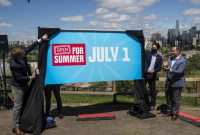Support strong Canadian climate journalism for 2025
The head of Alberta's health system says the COVID-19 hospital crisis has become so dire, a key reason the system hasn't collapsed is because patients are dying.
"Each day we see a new high (total of critically ill patients)," Dr. Verna Yiu, president and CEO of Alberta Health Services, said Thursday.
Yiu said hospitals have admitted two dozen or more critically ill COVID-19 patients on average each day since Sunday.
"It's tragic that we are only able to keep pace with these sort of numbers because in part some of our ICU patients have passed away," she said. "This reality has a deep and lasting impact on our ICU teams."
There were 310 patients Thursday in intensive care, the vast majority of them with COVID, and the vast majority of the COVID patients are not fully vaccinated or not vaccinated at all.
Alberta normally has 173 ICU beds, but has doubled that number to 350 by taking over extra spaces, such as operating rooms, and reassigning staff.
The result is non-urgent surgeries have been cancelled en masse across the province, including transplants, tumours, cancer operations and surgeries on children.
Physicians are being briefed in case resources get so short, they have to decide on the spot which patients get life-saving care and which don’t.
Yiu said it's a fluid situation and they're still determining when and how doctors will be asked to make those life-and-death decisions.
The United Conservative Party government has reached out for medical help from other provinces and from the federal government.
Bill Blair, the federal minister of public safety and emergency preparedness, said Ottawa can help by providing more critical care medical staff and by having the military airlift patients to other provinces.
"The Government of Canada will support the provincial government's recent request and provide the necessary support," Blair wrote in a statement on social media earlier Thursday.
"The federal assistance includes a range of capabilities, including the deployment of (Canadian Armed Forces) medical resources and/or aeromedical evacuation capability, as well as the deployment of Canadian Red Cross resources."
There are more than 20,100 active COVID-19 cases in Alberta and more than 1,000 people in hospital with the illness. Deaths have also been on the rise. There were 29 fatalities reported Tuesday, 20 more Wednesday — including the first person under age 20 — and 17 on Thursday. More than 2,600 people have died in Alberta.
In Calgary, Alberta's Opposition NDP leader said it's time for Premier Jason Kenney to hand over public health decisions related to COVID-19 to medical professionals.
Rachel Notley said it has become clear that Kenney is more focused on his political survival than the pandemic.
"It never should have come to this," Notley said.
"Jason Kenney knew his plan wasn't working as early as July and he did nothing. In fact, he left (on a vacation). All through August and into September the UCP refused to act while the crisis escalated.
"Now all Albertans are suffering the consequences of the UCP's collective inaction and ineptitude."
Notley said sound public health decisions are being undermined by political compromises and called for the decisions to be turned over to Dr. Deena Hinshaw, Alberta's chief medical health officer, backed by an independent scientific panel of advisers.
For months, Kenney has faced escalating criticism and calls for his resignation over his handling of COVID-19. The criticism began before last Christmas when his government was late to react to a second wave swamping hospitals. The government was late again in the third wave in May and is now chasing the pandemic again in what has become the fourth, and worst, wave.
At each stage, Kenney has been accused of pandering to anti-restriction elements in his party and waiting too late to implement rules to maintain public health.
Some United Conservative constituency associations are pushing for an immediate review of his leadership.
Joel Mullan, the party's vice-president in charge of policy, has openly called for Kenney's resignation, saying the public and the party have lost trust.
Kenney met with his caucus Wednesday and later asked the party to move up a leadership review from late 2022.
"The premier spoke with the president ... and requested that the 2022 UCP (annual general meeting) take place in the spring and that the scheduled leadership review occur at that time," Dave Prisco, the UCP director of communications, said in a statement. "The party is working to confirm a date and venue to make it a reality."
Kenney deflected reporters' questions earlier this week on whether he should resign, saying he's focused on COVID-19 and not on political intrigue.
This report by The Canadian Press was first published Sept. 23, 2021.






Comments